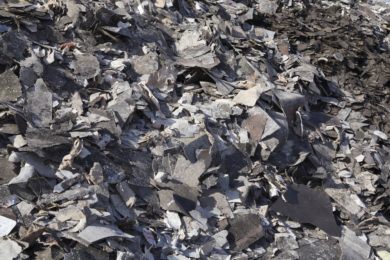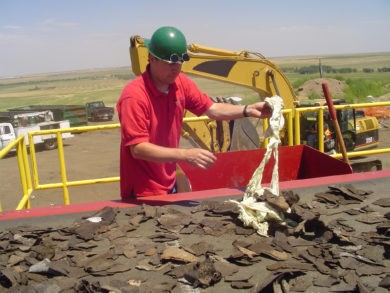The United States produces an average of 13 million tons of shingle waste annually from roofing manufacturers and roof tear-offs. However, according to Business Insider, only about 10% of these 13 million tons of shingles are sent to material recovery facilities for recycling and reuse. Asphalt shingles are the most popular roofing material in the United States. It can take up to 400 years to fully decompose. Because asphalt shingle waste is so high, businesses and consumers must be aware of viable recycling methods.
Asphalt Properties and Shingle Disposal
Asphalt shingles are made by coating organics (paper, cellulose, and wood) or fiberglass sheets with asphalt and granules of sand, glass, or ceramic, which are added to increase durability. An organic asphalt shingle roof can last 20–30 years, yet typical asphalt shingle roof warranties span approximately 25-30 years. This means total roof replacements happen more frequently than the shingles’ estimated lifespan. Additionally, more expensive fiberglass asphalt shingles can last up to 50 years.
However, when asphalt shingle roofs need replacement due to extensive wind damage, age, leaks, or water damage, they are often well below their lifetime expectancy. This decrease in time used and increase in additional shingle products needed can cause waste management problems if asphalt shingles are not sustainably disposed of or recycled.
Asphalt Shingle Recycling Benefits
Asphalt, a viscous, petroleum-based product (and, therefore, a nonrenewable resource), is an excellent roofing material because it is durable and water-resistant, effectively protecting homes from weather-related damage. However, the same characteristics that make asphalt an excellent roofing material also make asphalt shingle waste a problem if improperly handled and disposed of. As shingles sit out in the elements they become oxidized, causing the material to become more hard and brittle.
However, recycling asphalt shingles is more than keeping them out of landfills. Recycled asphalt decreases the cost of filling potholes and repaving roads, which can help reduce taxpayers’ road maintenance costs. Additionally, shingle recycling creates jobs in cities across North America.
Asphalt Shingle Recycling Process
Asphalt shingle recycling involves repurposing shingles into an additive for hot-mix asphalt (HMA) or cold patches to fill road cracks and potholes. To do this, after the roofing waste is sorted through a trommel screen and manual sort line to remove extraneous (non-asphalt) materials, the shingles are ground into a ⅜” minus state depending on state and local regulations using asphalt shingle grinders, which are specially designed to handle the abrasive material. Finally, a magnetic separator removes any remaining metal scraps and nails that haven’t been filtered out yet.
The final product is Recycled asphalt shingles (RAS). Larger RAS particles are used for the base stabilization course, the lower layer of paving, while smaller, finer particles are used in the surface course, the top layer of paving.
Complications
Asphalt shingles typically come to a processor via roll-off directly from a job site during recycling. The primary contamination in these loads is the tar paper underneath the shingles and the nails used to hold it in place. Other contaminants typically come from the job site (pallets, plastic bottles, trash). There are some best practices that the job site can follow to help the loads be more easily processed, but this is not widespread through the general construction industry and often falls to shingle processors to educate people in their area.
One aspect of shingles is that once they have been ground, they can agglomerate if stored for an extended period. This means that material tends to be stored un-ground, and the grinding operation is performed right before use. Some companies will bring mobile equipment to the site to accomplish this task when RAS is needed.
Recycled Asphalt Regulations
As shingles sit out in the elements, they become oxidized, which makes the material harder and brittle. Because of this, HMA can only be composed of up to five percent recycled shingles (by weight), and the remaining weight is made up of softer asphalts to offset the hardness of the asphalt shingles.
In the mid-2000s, RAS was widely used in asphalt mixes, but because this was new and there had yet to be much testing done, some RAS paved roads failed prematurely. This was due to a lack of knowledge about how incorporating RAS into the mix would affect the material’s performance. Up until 2014, RAS was becoming more widely used in the industry. Still, its use declined rapidly due to the failures of the early material mixes. This has caused the industry and regulatory bodies to become cautious about allowing its use.
RAS regulation in asphalt mixes happens at the state level, and each state is different. States that have companies within them actively participating in shingle recycling tend to have more favorable regulations. Some states still don’t permit the use of RAS. The asphalt industry has developed testing procedures and standards for mix design (“balanced mix design,” or BMD) that will ensure long-term performance to get more states to allow the use of RAS.
Handle RAS With GK Recycling Equipment
Are you looking to improve your shingle recycling process? The General Kinematics, FINGER-SCREEN™, can improve shingle separation for further processing. Contact our resource recovery experts to learn more. Want to learn more about shingle recyclers near you? Visit shinglerecycling.org.









